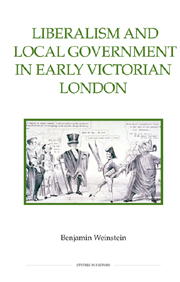Book contents
- Frontmatter
- Contents
- Acknowledgements
- Abbreviations
- Introduction
- 1 Liberal attachments to the unreformed metropolis
- 2 The ‘radicalisation’ of metropolitan political culture, 1832–1841
- 3 The polarisation of metropolitan political culture, 1842–1855
- 4 Redefining the state, I: Rates and taxes, 1834–1853
- 5 Redefining the state, II: The London government problem
- 6 Marylebone in 1854: from conflict to compromise
- Conclusion
- Bibliography
- Index
Conclusion
Published online by Cambridge University Press: 12 September 2012
- Frontmatter
- Contents
- Acknowledgements
- Abbreviations
- Introduction
- 1 Liberal attachments to the unreformed metropolis
- 2 The ‘radicalisation’ of metropolitan political culture, 1832–1841
- 3 The polarisation of metropolitan political culture, 1842–1855
- 4 Redefining the state, I: Rates and taxes, 1834–1853
- 5 Redefining the state, II: The London government problem
- 6 Marylebone in 1854: from conflict to compromise
- Conclusion
- Bibliography
- Index
Summary
From the later 1840s radical and liberal critics of Russell's government found in Lord Palmerston a handy foil to the unpopular prime minister. Although Palmerston served as foreign secretary throughout Russell's first administration, he was no Russellite and certainly no ministerial stooge. He was, as Russell grudgingly conceded, the only truly ‘popular’ minister within the government. From 1848 Russell understood that his increasingly weak ministry could not survive Palmerston's defection, and he consequently often indulged Palmerston's borderline insubordination. During the 1850s Palmerston's growing reputation among liberals and radicals proceeded from an admiration of his foreign policy, and from an appreciation of Palmerston's qualities as a statesman and leader. Whereas Russell's support for the Hungarian, Italian and Polish independence movements was equivocal at best, Palmerston was a committed and outspoken champion of continental liberties. These differences of perspective and priority on European issues were thrown into pronounced relief from 1850, when a series of public disagreements brought the prime minister and his foreign secretary into direct confrontation. Russell's final estrangement from Palmerston began in September, with Palmerston's provocative handling of the Haynau affair. Tellingly, this only enhanced Palmerston's popularity, while further damaging Russell's.
In the wake of the Haynau affair, tensions between Russell and Palmerston again escalated when Palmerston was ordered by Russell not to meet with Kossouth. Although Palmerston complied, he none the less received, and endorsed, a deputation from Finsbury radicals (including Wakley, George Rogers, the Muswell Hill circle radical William Shaen, and the former anti-centralisation union co-chairman Charles Elt) which referred to the Russian and Austrian emperors as ‘odious and detestable assassins’ and which offered congratulations on Palmerston's anti-Russian policy.
- Type
- Chapter
- Information
- Liberalism and Local Government in Early Victorian London , pp. 167 - 176Publisher: Boydell & BrewerPrint publication year: 2011



